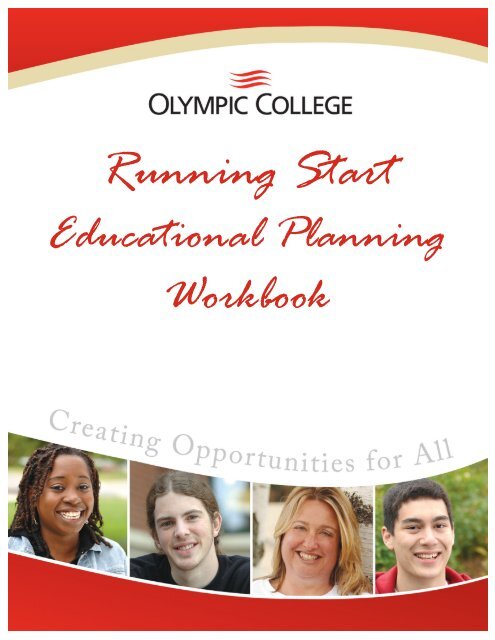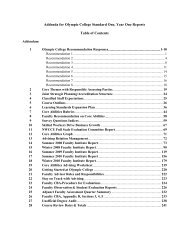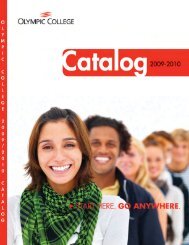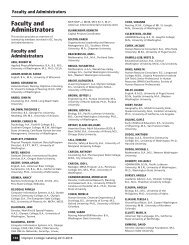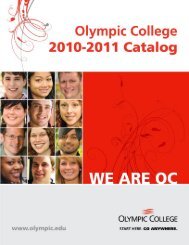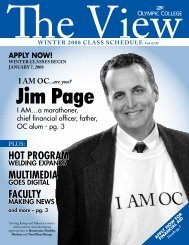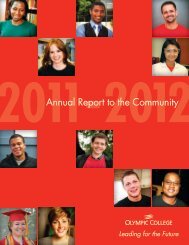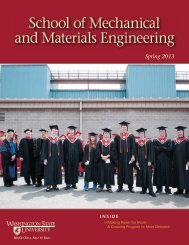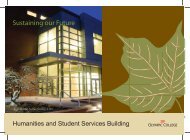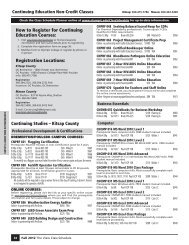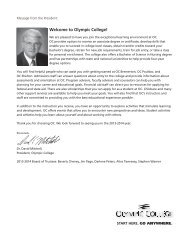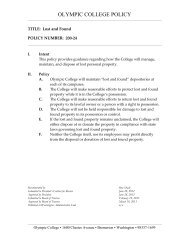Educational Planning Workbook - Olympic College
Educational Planning Workbook - Olympic College
Educational Planning Workbook - Olympic College
Create successful ePaper yourself
Turn your PDF publications into a flip-book with our unique Google optimized e-Paper software.
Running Start<br />
<strong>Educational</strong> <strong>Planning</strong><br />
<strong>Workbook</strong>
Updated 4/11 Page 1
Running Start<br />
1600 Chester Ave<br />
Bremerton, WA 98337<br />
HSS 208<br />
Office Hours: 8:00 a.m. - 4:30 p.m., Monday - Friday<br />
Phone:<br />
360-475-7646 or<br />
1-800-259-6718 ext. 7646<br />
Fax: 360-475-7643<br />
Email:<br />
RunningStart@olympic.edu<br />
Patty Triggs Bonnie Ollos Heather Ashley<br />
Director and Advisor Coordinator and Advisor Program Assistant<br />
360-475-7648 360-475-7647 360-475-7649<br />
ptriggs@olympic.edu bollos@olympic.edu hashley@olympic.edu<br />
Running Start and High School Outreach Mission Statement<br />
Our mission is to promote access to quality education by providing information to local<br />
high school students and counselors about admission procedures and educational<br />
opportunities at <strong>Olympic</strong> <strong>College</strong>.<br />
We promote the success of Running Start students by providing quality enrollment,<br />
orientation and advising services.<br />
We are dedicated to providing courteous, student-centered service, accurate and<br />
consistent advising and opportunities for student development.<br />
Page 2
This workbook belongs to:<br />
Welcome to <strong>Olympic</strong> <strong>College</strong> and the Running Start Program!<br />
This planning guide has been developed especially for you. Complete items in your workbook as you meet with<br />
advisors and progress through your education at OC and beyond.<br />
You have the responsibility of assessing your skills and interests, determining your personal, educational and career<br />
goals and developing an educational plan. Take time to utilize resources available at the high school and the<br />
college. Working closely with your high school counselor, your Running Start advisor and OC faculty will aid you in<br />
the achievement of your goals.<br />
TIP* Careful thought and planning is important to your academic success.<br />
Think of your high school classes, OC classes and university programs as overlapping, not sequential. <strong>College</strong><br />
classes that you take for high school requirements can fulfill college general requirements or can be applied to a<br />
college major or university graduation requirements. If you intend to transfer, early selection of your major and<br />
transfer school will help you and your advisors plan for appropriate courses. Don’t wait – Plan now! Plan for the<br />
whole academic year, not just for a quarter at a time. This workbook is designed as an outline to help you meet<br />
your goals.<br />
Learning Outcomes – Through advising at OC Running Start students will:<br />
Understand the purpose of higher education and understand how college is different than high school.<br />
Know the credits you need for high school graduation.<br />
Become familiar with the <strong>Olympic</strong> <strong>College</strong> programs, and policies and procedures.<br />
Plan a class schedule and navigate registration on time each quarter.<br />
Be able to access college services and co-curricular opportunities.<br />
Be able to research careers based on your life goals, interests and abilities.<br />
Identify an educational goal or college major and transfer school.<br />
Identify college/department admission requirements and major prerequisites.<br />
Create a plan of classes to meet your educational goals using advising materials, OC degree worksheets and<br />
transfer information.<br />
Assume responsibility for managing progress toward meeting your goals.<br />
Appreciate the value of lifelong learning.<br />
Page 3
To assist you in pursuing your educational goals Running Start Advisors will:<br />
Provide a friendly open atmosphere that will foster self-exploration and awareness.<br />
Be accessible to you during office hours, or by telephone and email communication.<br />
Use good communication skills; listen well and respond to your interests and concerns.<br />
Assist you in the selection of appropriate classes and encourage you to be self directed and self sufficient.<br />
Have an understanding of current curriculum, college requirements, course sequences and AAS degree<br />
requirements and review your progress.<br />
Help you understand the college environment and clarify college policies and procedures.<br />
Direct you to appropriate college educational, career and learning services, campus resources and co-curricular<br />
activities.<br />
Keep up-to-date information for transfer resources and referrals.<br />
Participate in appropriate training and advising information networks.<br />
Maintain accurate records of contacts with you.<br />
Be available for advising appointments and provide Running Start Orientation, educational planning<br />
workshops, fall college fair, and graduation workshops.<br />
Who else can help you?<br />
High School Counselors help you select classes that will meet requirements for high school graduation.<br />
They can help you set goals and consider elective classes based on your skills and<br />
interests.<br />
Faculty Advisors are full-time OC faculty members who are experts in their teaching fields and can advise you in<br />
your major (English, Business, History, etc.) or your professional technical area of study<br />
(Culinary Arts, Early Childhood Education, etc).<br />
OC Counselors provide career and personal guidance and help students who are exploring career and educational<br />
options.<br />
<strong>College</strong> and university admission counselors and department advisors welcome inquiries about college admission,<br />
major prerequisites and graduation<br />
requirements at their school.<br />
The Transfer Center located in the Advising Center maintains transfer resources for students and arranges<br />
transfer fairs and college visits to OC.<br />
Page 4
Understand the purpose of higher education and how college is different from high school.<br />
<strong>College</strong> offers students an opportunity to learn in a diverse adult environment and be accountable for their own learning.<br />
Learn skills that will apply across careers – critical thinking, managing time, setting goals and how to study. Gain a broad view<br />
of the world through many academic disciplines.<br />
Learn about how people in various areas of fields relate to each other and how they solve problems. Master communication<br />
skills and mathematical skills. Studying the greatest works in many fields and gain knowledge from the greatest thinkers and<br />
scientific and creative minds. Discover your interests and values and dialog with others. We look forward to the contributions<br />
you will make to <strong>Olympic</strong> <strong>College</strong>.<br />
Know the credits you need for high school graduation.<br />
Find out the classes at <strong>Olympic</strong> <strong>College</strong> that satisfy those requirements.<br />
Meet with your counselor each quarter to plan classes and do a credit evaluation for graduation. Most high schools<br />
have a general policy or equivalency list of <strong>Olympic</strong> <strong>College</strong> classes that will meet your specific high school<br />
requirements. Don’t forget that most four-year colleges have high school core requirements for English, social<br />
studies, mathematics, foreign language, science, and fine arts. *TIP Refer to handout: Admission Requirements<br />
for Washington <strong>College</strong>s.<br />
List high school requirements on page 13 ‣<br />
Become familiar with the <strong>Olympic</strong> <strong>College</strong> educational programs, policies and procedures.<br />
Resources:<br />
OC Catalog<br />
The View, the quarterly class schedule<br />
Student Handbook<br />
OC Website - www.olympic.edu<br />
OC Degrees: Associate in Arts (AA), academic transfer degree,<br />
Associate of Science (AS), transfer degree for science majors<br />
Associate of Applied Science-Transfer, (AAS-T), applied transfer degree, early childhood education<br />
only.<br />
Associate of Technical Arts (ATA), professional technical degree for job skills, generally not<br />
transferable to a four-year college/university, some have special transfer agreements.<br />
Technical Certificates, short term professional technical education<br />
Associate in General Studies, (AGS), Non-Transfer degree.<br />
Page 5
Direct Transfer Agreements<br />
The AA and AS degrees are Direct Transfer Agreement (DTA) degrees which give students junior status at<br />
Washington State baccalaureate institutions and some WA independent schools, with most general requirements<br />
fulfilled. Consult the catalog to clearly understand associate degree requirements, English and quantitative skills<br />
general requirements, distribution requirements in Humanities, Social Sciences and Natural Sciences and the<br />
appropriate classes for you for electives. Learn about campus resources, student records, grades and grade appeal<br />
process, technical programs, transfer curricula, course descriptions, student conduct code, glossary of academic<br />
terms, and staff and faculty directory, etc.<br />
Plan a class schedule and register on time each quarter.<br />
Read The View, the class schedule, and know the advising, registration and drop/add dates and procedures. Read<br />
class descriptions, review class textbooks in the bookstore and know your high school requirements, skills and<br />
strengths. Use OASIS (Online Access to Student Information System) kiosks on campus and on the Web site at<br />
www.olympic.edu to access your registration time, your schedule and your grades using your global pin.<br />
*TIP Your global pin is your birthday –MMDDYY- which you can change if you want.<br />
The Class Schedule Planner online is a great tool to use in planning your quarterly schedule. Learn how to move<br />
through the advising and registration system smoothly. The Running Start Office will send information by email<br />
and newsletter, Running Start Currents. Make appointments with your high school counselor and college advisor<br />
and register for classes at your time to register to get the best choice for classes you want. Have questions ready,<br />
have forms completed and be prepared for your appointments with your high school counselor and college<br />
advisor. OASIS allows students to get on a waitlist if a class is full.<br />
Research careers based on life goals, your interests and abilities.<br />
Do a self-analysis and evaluation of your skills, values and life and career goals. Decide on some long range and<br />
short-term objectives. Utilize career and college information and staff available at the high school and college<br />
career and counseling centers. Research information about careers and gather information about present and<br />
future job markets. Go to the Occupational Handbook Outlook online. Learn to use informational interviews.<br />
Contact someone who is successfully employed in a career you may be interested in and interview that person<br />
about his/her work. Take advantage of opportunities for employment or internships: look for volunteer, summer,<br />
and part time employment in potential career fields.<br />
Page 6
Assess your values:<br />
What influences your decisions?<br />
What beliefs do you have?<br />
What is really important for you?<br />
How important is it for you to help others,<br />
serve your community or make money?<br />
What motivates you?<br />
What are your realities?<br />
Explore your interests:<br />
What activities do you like to participate in?<br />
What topics do you enjoy reading or talking about?<br />
What classes do you enjoy the most?<br />
What do you dream about doing?<br />
What kinds or activities are you not interested in?<br />
Assess your abilities:<br />
What are your strengths and your challenges?<br />
What are your natural talents?<br />
How have others rated your abilities?<br />
Have you won honors or awards?<br />
How strong are you study skills?<br />
What are your personality traits?<br />
Resources to help in your career search at <strong>Olympic</strong> <strong>College</strong>:<br />
Counseling Services: Counselors provide a wide variety of services to help students: career interest testing, career<br />
planning and decision-making, help with academic and transfer decisions, personal<br />
counseling, and quarterly workshops.<br />
Career Center: Occupational resources and career assessments are available to assist students with career<br />
decision-making process. You can utilize online career resources for career or employment<br />
research. Find out opportunities for Internships and volunteer service related to your learning.<br />
Haselwood Library: Librarians can guide you to career references and online resources.<br />
Faculty: Talk to OC instructors about your interests and college classes.<br />
Page 7
Be able to access college services and co-curricular opportunities.<br />
Using a campus directory of college services and co-curricular activities in the catalog, View or student handbook,<br />
locate services that you may want to use to enhance your success. Research indicates that students who are connected<br />
to campus beyond the classroom are generally more successful. Circle resources you are interested in.<br />
Studying and classes<br />
General Studies 100, Strategies for Academic Success<br />
Writing Center, brainstorming ideas, writing papers, planning research<br />
Math Study Centers, math and science tutoring<br />
Tutorial services and drop in labs<br />
Access Services for students with disabilities<br />
Computing resources<br />
Library and media services<br />
Distance learning<br />
Child care<br />
Leadership, social, fun and recreation<br />
Multicultural Center<br />
Recreational activities, Fitness Center<br />
Student clubs and organizations<br />
Student government – Associate Students of <strong>Olympic</strong> college<br />
Related to your career<br />
Music performance classes and private lessons<br />
Drama productions<br />
Counseling services, workshops or for career, academic and personal concerns<br />
Career Center, career resources and assessments<br />
Student employment, internships and volunteer service<br />
Student newspaper, the Olympian<br />
Page 8
Identify a college major or educational goal and transfer school.<br />
Choosing a technical program or a particular college major may be a bit overwhelming. As you take classes you<br />
need for high school requirements and explore interests, ask yourself if this professor or that subject interests you<br />
enough to take more classes. Keep an open mind. Don’t overlook one of your best resources – your own<br />
experience. Investigate college majors on university web sites. Read about majors and required classes or look<br />
through required textbooks or sit in on a class. Choosing a major does not limit you to just one career. Choosing a<br />
career does not limit you to just one major.<br />
Why plan for a major now?<br />
Many students take a random selection of classes at a community college to fulfill the associate degree<br />
requirements but do not take time to think seriously about a college major. Postponing major exploration<br />
and selection could cost you more tuition later.<br />
Many majors take four years to complete. If you select a major like business, engineering, or foreign<br />
language and don’t start until your junior year it will take you six years to finish your bachelor’s degree.<br />
Many majors require students to take classes in sequence, for example chemistry, mathematics, or music<br />
theory. This means you may only be able to take one course at a time. You want to have completed<br />
freshman and sophomore level courses so you can be ready for upper level courses if you are transferring<br />
to a four-year school.<br />
Many majors have a specific set of admission requirements or prerequisite courses, like business, biology,<br />
many of which may be completed at <strong>Olympic</strong> <strong>College</strong>.<br />
Some departments at the transfer school may allow students to enter the program only once a year. If you<br />
have already completed those courses at our community college you may be ready to enter the<br />
department. University of Washington, Seattle, for example requires transfer students to have major<br />
prerequisites completed.<br />
Students at four-year institutions are often required to declare a major early in the junior year and are<br />
expected to have already given the major some serious consideration and planning by that time.<br />
Some majors at some schools are very competitive, meaning that many students are choosing that major<br />
and standards for admission are very high. If you are interested in a highly competitive major you may want<br />
to plan your courses very carefully.<br />
What colleges/universities are you interested in?<br />
Do they offer the major you want?<br />
What are the admission requirements for the college or university?<br />
Page 9
Attend Transfer Fairs at <strong>Olympic</strong> <strong>College</strong> or visit colleges on transfer days for admission information. Review<br />
college admission requirements.<br />
*TIP Remember that Washington colleges require Running Start students to apply as freshman if you apply while in<br />
high school, even if you have an associate degree.<br />
You will be eligible for many freshman scholarships and other benefits but you will also be granted transfer credit<br />
and advanced class standing. You will need SAT or ACT scores and high school core requirements, for example,<br />
fine arts and foreign language requirements. Spring of your junior year is the best time to take admissions tests, so<br />
you may retake the test if necessary.<br />
Identify college/department admission requirements and major prerequisites.<br />
Some colleges and departments have no special admission requirements. Some are highly competitive or require<br />
completed prerequisites or are only fall entry. Utilize college transfer information available in the Advising Center<br />
and from faculty advisors. <strong>College</strong>s and universities in Washington have detailed transfer guides available online or<br />
in print which list course equivalencies for all community colleges in Washington. See transfer advising at<br />
www.olympic.edu/RunningStart. You can also schedule a transfer advising appointment with a Running Start<br />
advisor.<br />
Use college web sites to learn about academic departments – access Washington schools at www.access.wa.gov<br />
and click on education. UW and WSU have sites where you can establish an advising account to research<br />
requirements for one or more majors, verify how your community college courses transfer and see how your<br />
courses apply toward major and bachelor’s degree requirements.<br />
*TIP Contact transfer institutions directly for information, department admission requirements, arrange a campus<br />
visit and talk to department advisors.<br />
Most colleges have prospective student information sessions and visitation programs. It’s never too early for you<br />
to investigate the requirements of your intended major – no later than the end of the freshmen year. Determine if<br />
it is better for you to complete a degree or take required prerequisites for a particular program, particularly if you<br />
will attend an out-of-state college. Contact out-of-state colleges for admission information for Running Start<br />
students. Explain that Running Start is a dual credit program - you earn high school and college credit for OC<br />
classes.<br />
Seriously investigate the school you are thinking about attending.<br />
List college/department admission requirements and major prerequisites on page 13 ‣<br />
Page 10
Create a plan of classes to meet your educational goals using advising materials, OC degree worksheets<br />
and transfer information.<br />
Put it all together. List the classes that you need for your high school, transfer college admission, to meet your<br />
major, and AA, AS or ATA degree on the next page. Or create your own plan. Find out when classes you want are<br />
offered and plan for a whole year. Share your goals with your high school counselor and Running Start advisor.<br />
They can help you find resources, select classes, and finalize your plan. Each quarter you will meet before you<br />
register. Have several alternate classes and class times in mind in case some classes are closed. You may need to<br />
revise your plan based on the class availability, but you will know the classes you need.<br />
Assume responsibility for managing progress toward meeting your goals.<br />
Track your high school and college progress toward your goals each quarter. Make sure you know high school<br />
requirements and understand college and degree information yourself! Ask questions and seek assistance from<br />
your professors, advisors and college staff if you need help. Develop a support system of friends, family and<br />
college community. If you plan to earn an OC degree, use the catalog and degree worksheet to keep track of<br />
requirements as you complete them. Apply for your degree after you register for your last quarter, most<br />
commonly, spring quarter.<br />
Prepare for your next steps. If you plan to transfer, prepare your application essay and complete applications.<br />
Complete financial aid and scholarship applications. An application notebook is a good way to keep track. See a<br />
sample in the Running Start Office. Contact OC faculty for recommendations. Let Running Start advisors know if<br />
you need help.<br />
Appreciate the value of life-long learning.<br />
Set new goals! Update your educational plans and continue to learn throughout your lifetime.<br />
Page 11
Advising Notes<br />
Page 12
High School Graduation Requirements Credits <strong>Olympic</strong> <strong>College</strong> Courses Credits<br />
1st Choice Major / Program :<br />
Admission Requirements<br />
Transfer School:<br />
Major Prerequisites<br />
2nd Choice Major / Program :<br />
Admission Requirements<br />
Transfer School:<br />
Major Prerequisites<br />
Page 13
<strong>Olympic</strong> <strong>College</strong> <strong>Educational</strong> Plan<br />
Name: SID: AA AS ATA<br />
Major:<br />
Faculty Advisor<br />
Transfer School<br />
List the classes you plan to take and the number of credits.<br />
Summer<br />
( )<br />
( )<br />
Fall Winter Spring<br />
( ) ( ) ( )<br />
( ) ( ) ( )<br />
( ) ( ) ( )<br />
( ) ( ) ( )<br />
Summer<br />
( )<br />
( )<br />
Fall Winter Spring<br />
( ) ( ) ( )<br />
( ) ( ) ( )<br />
( ) ( ) ( )<br />
( ) ( ) ( )<br />
Summer<br />
( )<br />
( )<br />
Page 14
www.olympic.edu<br />
1.800.259.6718 or 360.792.6050<br />
Mission<br />
We serve and enrich all our communities by providing quality education and training for all who seek to improve their<br />
lives through learning.<br />
Vision<br />
At <strong>Olympic</strong> <strong>College</strong> we envision learning as a life enhancing journey of discovery where:<br />
Our students are life-long learners in a global society.<br />
Our employees are empowered to achieve the college mission.<br />
Our community recognizes the college as its cornerstone of learning.<br />
Values<br />
We honor our shared values by holding ourselves and each other accountable for:<br />
A dedication to public service and Higher Education<br />
A commitment to life-long learning<br />
The practice of civil and constructive discourse and respect for diversity.<br />
A quest for community and environmental health.<br />
The thoughtful use of our finite resources, including ourselves.<br />
Campus Locations:<br />
<strong>Olympic</strong> <strong>College</strong> Bremerton<br />
360.792.6050 or 1.800.259.6718<br />
360.475.7151 FAX<br />
<strong>Olympic</strong> <strong>College</strong> Poulsbo<br />
360.394.2725<br />
360.394.2705 FAX<br />
<strong>Olympic</strong> <strong>College</strong> Shelton<br />
360.432.5400<br />
360.432.5412 FAX<br />
Note: The mailing address for <strong>Olympic</strong> <strong>College</strong> campuses is 1600 Chester Ave., Bremerton, WA 98337-1699<br />
<strong>Olympic</strong> <strong>College</strong> does not discriminate on the basis of race, color, national origin, sex,disability, sexual orientation, or age in its programs and activities.<br />
Reasonable accommodations are available for people with disabilities.


